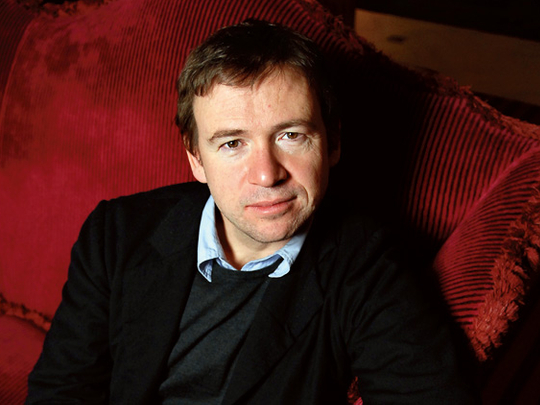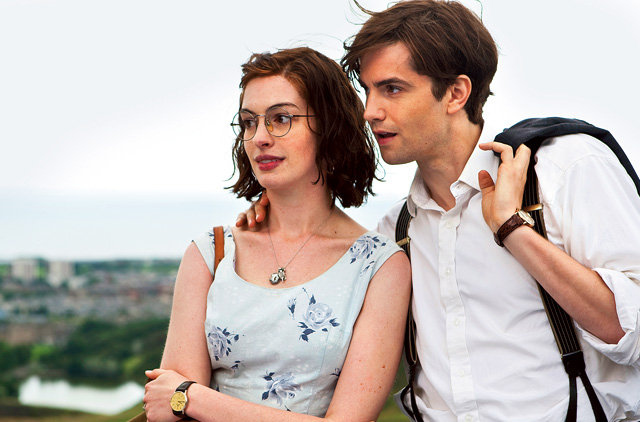
David Nicholls is still basking in the success of his book One Day, first published in 2009 and made into a movie starring Anne Hathaway and Jim Sturgess in 2011. Although it is essentially a very English story, it captured the imagination of book-lovers all over the world, which was an unexpected bonus for the 45-year-old author. "It was a pleasant surprise to me that One Day was so widely appreciated by readers,'' he says.
Wide appreciation indeed: the book has sold more than 700,000 copies and has been translated into 37 languages.
The novel's unique structure charts events as they unfold on one particular day throughout the years, opening on July 15 1988, when two students, Dexter and Emma, meet for the first time. The story then revisits the two protagonists separately or together on the same date over the next 20 years.
Trained as an actor, David - who has written two other books Starter for Ten (2003) and The Understudy (2005), the former of which was also made into a movie - has scripted Simpatico (1999), Tess of the D'Urbervilles (2008) and is currently writing the screenplay for Far from the Madding Crowd.
In advance of his visit to Dubai to participate in the Emirates Airlines Festival of Literature, he tells Friday what he loves about his work, how he creates characters and his reasons for writing One Day:
Why do you think One Day had such universal appeal for readers?
I don't really know. I never really expected to be a novelist; originally I was an actor doing Shakespeare and Chekhov. And One Day is so specifically about a time and place, about people who are so distinctively English, even the cultural references are so specific that I thought it would only really work for people living in London in the age group of 35 to 45. But it's about how people see themselves - getting older, falling in and out of love, losing parents, losing jobs... I guess these things are universal and that's why it appealed to people around the world.
How did One Day come about?
I've always loved the old classic comedies of Billy Wilder and Woody Allen. When I turned to writing I was drawn to love stories and comedies; not the very sentimental love stories but those that have a mixture of both romance and cynicism, like the best of the 1930s Hollywood comedies.
While doing the screenplay for Tess of the D'Urbervilles, I came across a section in Hardy's book that planted the seed for my novel. It's where Tess gazes at herself in the mirror and a shiver runs down her spine at the thought that perhaps this is the date on which she will die. Tess thinks that we usually mark our birthdays and celebrate those sorts of anniversaries, but unwittingly we also go through the anniversaries of the date on which we are going to die.
The day the main characters of my book, Emma and Dexter, meet is an anniversary of their college graduation day and also an anniversary for something else - that secret is withheld from the reader until the end.
Are there autobiographical elements in your novels?
I think there were many autobiographical parts in my first book Starter for Ten. That is a truly heartfelt book and it is written about a time, place and a feeling I can identify with completely. Actually there is nothing of me in Dexter [One Day]. I didn't have one specific person in mind. But I had a lot of friends who left the university with a lot more confidence, ambition and money than I did. When I was an actor I knew a lot of handsome, successful men like Dexter.
Are there any aspects of Dexter's character that you are able to identify with?
I can identify with his concerns about the ups and downs of his career and the fear of not doing so well. Despite his superficiality and shallowness he is quite likeable. When I was writing the book, I had just become a father and in the books Dexter becomes a father. I did draw upon the elation and fear of becoming a parent and the anxiety about not having the skill, patience or dexterity to handle this role.
Did you intend to shock the reader with the ending of One Day?
The end was not done on a whim. I don't think I wanted to shock the reader. The premise of the book was to write about Dexter's one day, which is an anniversary that is a secret to the reader. In fact the whole book was leading to that event. The story is about redemption and how the influence of our friends and their advice makes us better. Dexter is redeemed before that terrible event. I do not mind if the action of the book is seen as a story of redemption.
Do you think your book will make a lot of people think about ‘the one who got away'?
I do get a lot of letters about how the book has made people think of an old friend or helped someone restart a relationship. Everyone does have a relationship that failed. This story is the bitter-sweet account of such a relationship.
Is friendship the basis of a good relationship?
For me it is. I think both friendship and a good relationship are the same thing. I can't imagine a relationship working without a fiery and intense friendship.
What did you make of Anne Hathaway, an American, playing the role of Emma, a quintessentially English woman?
Anne Hathaway did an amazing job of the role. People often ask me why such a big shot from Hollywood was imposing herself on a small British movie. I don't understand when people say that she is distinctively American. A lot of British actors play American roles and we accept that. She was one version of Emma. So was Jim Sturgess, who played Dexter. In fact, many people thought that he was a lot more sympathetic than the character of Dexter in the book. I feel it is wrong to compare a film with the novel as they can never be the same.
What's more challenging - writing a screenplay or a novel?
Writing a novel. Most of the screenplays I've done are adaptations of classics. So someone else has done the difficult work. I can work on the most complicated scripts and still be able to write a screenplay in two to three weeks. Writing adaptations is a little like editing.
But a book can take up a good part of a year or two. I found writing my first book incredibly easy. Working on my next book became a harder and a more intimidating process. You are not quite sure as a writer if you want to give 18 months to two years of your life to an idea that might not take off eventually. It took me two years to write One Day.
A lesson on characterisation for budding writers?
Characterisation is tricky. I think as a writer you have to know everything about the character - a complete biography - which includes the parts that appear in the story and also those that don't. You need to have details about their family members, record collections, favourite songs, birthdays. Your characters have to be the same people at all times.
What advice would you give to new writers?
Read as widely as possible and experience the high and low of different cultures.
How have the writing styles of your favourite authors influenced your own?
I can say that passages, moments, characteristics and moods are taken from books and films. Billy Wilder was an influence and so was F Scott Fitzgerald.
The character you dislike the most from your novels?
I don't think I could write about anyone I dislike. Even Josh (Harper) in The Understudy, who is meant to be a negative character, is likeable. He has his charm and vulnerability. I don't think I can write about villains.
And which character do you like the most from your novels?
I love Emma in One Day. Even though she is by no means a perfect being, I felt most affection for her as she is most vivid in my mind. I think I need to shake her off.
What are you expecting at the Emirates Airline Festival of Literature?
Unlike Dexter, I am very badly travelled. I am delighted to come to this part of the world. It is the biggest surprise to me that so many people have read my books and I am very curious to meet people here.









